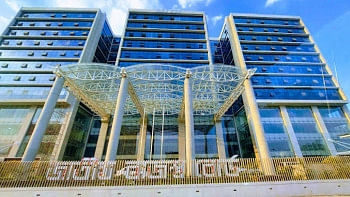Japan elects new government
On December 16, while we were celebrating the 41st anniversary of our Victory Day, the people of Japan went to the poling booths, voting the Liberal Democratic Party (LDP) back to power just in three years.
Shinzo Abe, a former prime minister (2007-2008), who was elected as the leader of the LDP in September 2012, was set to become the prime minister for second term on December 26 -- a record held by no other Japanese political leader since WWII. He is also expected to announce his cabinet on the same day.
The Democratic Party of Japan (DPJ), which lost the election, came to power in 2009 after evicting the then ruling LDP, which ran the country uninterruptedly for nearly 55 long years, riding on the mounting discontentment and disillusionment of the people. The Japanese voters also longed for a change, being infected by the American election which brought President Obama back to power.
No sooner had the DPJ came to power, its honeymoon was over as it got embroiled in financial scandals of its top leaders. The DPJ supremo and architect of its election victory, Ichiro Ozawa, had to renounce his prime ministerial aspiration, even before the election was held, under media exposure. His successor, Yukio Hatoyama, also had to quit the post of prime minister within a year over similar charges. Naoto Kan, who succeeded Hatoyama, failed to deal with the social and economic issues, engendering the people's dissatisfaction.
On the external front, Japan's relations with the US became cool over the US air force base in Okinawa, while relations with China, which started on a positive note (Ozawa, soon after the DPJ victory in 2009, took a delegation comprising 140 parliamentarians to Beijing as a show of changed Japanese attitude), also deteriorated over maritime disputes. In the Korean peninsula too, relations with South Korea were strained over territorial disputes while the North continued to flex its nuclear muscle, causing security scare in Japan.
The opposition LDP, in the meantime, slowly regained its strength and started challenging the government. As early as March 2011, there were talks of an imminent fall of the government, triggered by a major defection by its rank and file members.
Then suddenly the nation faced an unprecedented disaster. A huge tsunami, followed by a major earthquake, struck Japan on March 11, 2011, killing thousands of people and destroying property worth hundreds of billions of dollars. Coupled with these, four nuclear reactors in the affected area of Sendai-Fukushima exploded, releasing huge amount of radioactive materials. The government's response in the wake of the national calamity was less than adequate and lacked effectiveness.
The Kan government was not only perceived as incompetent and inept, but it was also revealed subsequently that the government suppressed vital information about the extent of damage caused by the nuclear explosion. On August 26, 2011, Kan resigned, making way for Yoshiko Noda to assume the government responsibility. Although Noda tried to repair the damage, the die was already cast. The Parliament was thus dissolved on November 16, paving the way for a new election to be held on December 16.
In the just concluded election Abe's LDP, together with its coalition partner New Komeito, captured 325 seats out of 480 seats (67.77%), giving it a 2/3 majority in the parliament, while the ruling DPJ made a poor second with only 57 seats (11.88%). A newly formed party led by the former maverick Tokyo governor and staunch nationalist Shintaro Ishihara pulled a surprise and was a close third in the race, capturing 54 seats (11.25%).
Abe, who is grandson of a former prime minister and son of a former foreign minister, is a pro-nationalist and conservative leader. While his immediate task will be to restore the economy and strengthen ties with Washington, he is likely to take a strong stance against China and South Korea over the territorial disputes. He is also in favour of amending the country's pacific constitution, framed by the US, and enhancing the role of the Self-Defence Force. Abe also wishes to retain nuclear power.
China, although it reportedly reacted with alarm at Abe's return to power, however, declared itself ready to work with Japan on "further development of stable relations."
Implication for Bangladesh
Japan-Bangladesh relations are founded on strong friendly ties built over the years since independence. Beginning with Bangabandhu, all our heads of state/government have visited Tokyo. Japan continues to be our number one development partner, and has generously contributed to the tune of $15 billion towards the development of our economy, infrastructure, poverty alleviation, disaster management, human resource development and several other areas. In recent times, trade, commerce and investment relations with Japan have also increased considerably. It has also written off a substantial amount of Bangladesh's past debt liability.
Notwithstanding the change in government, Japan's policy towards Bangladesh has remained unaffected. Japan has always attached high priority to our national development as demonstrated by its recent commitment to provide $2.7 billion for construction of Dhaka city metro rail. Its position on the construction of Padma Bridge is also known.
Prime minister elect Shinzo Abe and his wife Aki Abe are genuine friends of Bangladesh. Mrs. Abe visited Dhaka last year. Another close friend of Bangladesh, former prime minister Taro Aso, who is also the president of Japan-Bangladesh Parliamentary Friendship Association, is tipped to be appointed as deputy prime minister in the Abe cabinet.
The author, since his ambassadorial tenure in Tokyo, has maintained close relations with all of them. Following the election Abe, in a telephone conversation with the author, reiterated his sentiment about Bangladesh and promised to visit the country at a suitable time.
Therefore, it is expected that Bangladesh should be able to benefit from the favourable political climate in Tokyo, provided we can play our cards right.

 For all latest news, follow The Daily Star's Google News channel.
For all latest news, follow The Daily Star's Google News channel. 



Comments